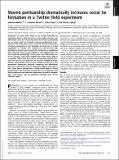Notice
This is not the latest version of this item. The latest version can be found at:https://dspace.mit.edu/handle/1721.1/133671.2
Shared partisanship dramatically increases social tie formation in a Twitter field experiment
| dc.contributor.author | Mosleh, Mohsen | |
| dc.contributor.author | Martel, Cameron | |
| dc.contributor.author | Eckles, Dean | |
| dc.contributor.author | Rand, David G | |
| dc.date.accessioned | 2021-10-27T19:54:06Z | |
| dc.date.available | 2021-10-27T19:54:06Z | |
| dc.date.issued | 2021 | |
| dc.identifier.uri | https://hdl.handle.net/1721.1/133671 | |
| dc.description.abstract | Americans are much more likely to be socially connected to copartisans, both in daily life and on social media. However, this observation does not necessarily mean that shared partisanship per se drives social tie formation, because partisanship is confounded with many other factors. Here, we test the causal effect of shared partisanship on the formation of social ties in a field experiment on Twitter. We created bot accounts that self-identified as people who favored the Democratic or Republican party and that varied in the strength of that identification. We then randomly assigned 842 Twitter users to be followed by one of our accounts. Users were roughly three times more likely to reciprocally follow-back bots whose partisanship matched their own, and this was true regardless of the bot’s strength of identification. Interestingly, there was no partisan asymmetry in this preferential follow-back behavior: Democrats and Republicans alike were much more likely to reciprocate follows from copartisans. These results demonstrate a strong causal effect of shared partisanship on the formation of social ties in an ecologically valid field setting and have important implications for political psychology, social media, and the politically polarized state of the American public. | |
| dc.language.iso | en | |
| dc.publisher | Proceedings of the National Academy of Sciences | |
| dc.relation.isversionof | 10.1073/pnas.2022761118 | |
| dc.rights | Article is made available in accordance with the publisher's policy and may be subject to US copyright law. Please refer to the publisher's site for terms of use. | |
| dc.source | PNAS | |
| dc.title | Shared partisanship dramatically increases social tie formation in a Twitter field experiment | |
| dc.type | Article | |
| dc.relation.journal | Proceedings of the National Academy of Sciences of the United States of America | |
| dc.eprint.version | Final published version | |
| dc.type.uri | http://purl.org/eprint/type/JournalArticle | |
| eprint.status | http://purl.org/eprint/status/PeerReviewed | |
| dc.date.updated | 2021-03-12T14:34:09Z | |
| dspace.orderedauthors | Mosleh, M; Martel, C; Eckles, D; Rand, DG | |
| dspace.date.submission | 2021-03-12T14:34:11Z | |
| mit.journal.volume | 118 | |
| mit.journal.issue | 7 | |
| mit.license | PUBLISHER_POLICY | |
| mit.metadata.status | Authority Work and Publication Information Needed |
